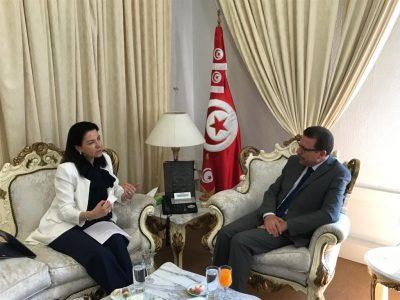
On 1 and 2 July 2019, Assistant Secretary-General Michèle Coninsx, Executive Director of the Counter-Terrorism Committee Executive Directorate (CTED), acting on behalf of the Counter-Terrorism Committee, conducted high-level consultations with the Republic of Tunisia aimed at reaffirming the Committee’s support for Tunisia’s counter-terrorism efforts and taking stock of progress and challenges in certain areas of its response to terrorism and its implementation of the relevant Security Council resolutions on terrorism. The consultations were held shortly after two suicide bombings had been carried out in Tunisia.
The Executive Director held meetings with the Minister of Justice, the Minister of Religious Affairs, the Secretary of State for Foreign Affairs, the Governor of the Central Bank, the President of the National Counter-Terrorism Committee (NCTC), as well as Directors at the Ministry of the Interior, the Ministry attached to the Prime Minister in Charge of Relations with Civil Society and Human Rights and the Ministry of Defence. ASG Coninsx also met with members of the international community and with the United Nations Resident Coordinator and Country Team.
During the visit, the delegation exchanged views with Tunisia on current terrorism threats and trends and the work of the Committee and CTED to address them, on progress made by Tunisia in implementing the relevant Council resolutions, on counter-terrorism legal, institutional and operational frameworks and on technical assistance needs.
In 2015, Tunisia adopted its National Counter-Terrorism Strategy, implemented by the National Counter-Terrorism Committee, which consists of all major government counter-terrorism agencies, and, among other things has significantly strengthened its security and border forces.
National authorities and international stakeholders supporting Tunisia’s efforts to address terrorism through the “G7+7”, a network of donors, implementing partners and national authorities, through which stakeholders collectively determine support priorities and coordinate closely in order to avoid duplication.

